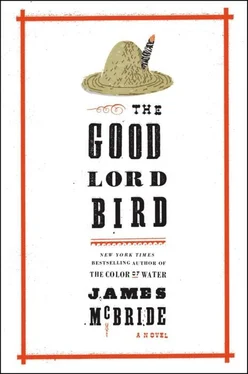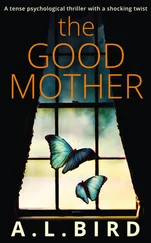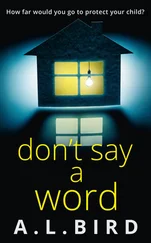We loaded up the wagon the day before the big attack and left without ceremony. The Captain gived Annie a letter and said, “This is for your Ma and your sisters and brothers. I will see you soon or in the by and by, Lord willing.” To me he said, “Good-bye, Onion. You has fought the good fight and I will see you soon as your people is free, if God wills it.” I wished him luck, and we was off. I jumped inside the bottom of the wagon in the hay. They covered me with a plank that spanned along the side of the wagon and placed Annie on it, while Salmon, who was driving, sat up front with his sister-in-law Martha, Oliver’s wife.
Annie was sitting right above me as we moved out, and I could hear her throw out a tear or two amid the clattering of the wagon. After a while she stopped bawling and piped out, “Your people will be free when this is all done, Onion.”
“Yes, they will.”
“And you can go off and get a fiddle and sing and follows your dreams all you want. You can go on about your whole life singing when it’s all done.”
I wanted to say to her that I would like to stay where she was going and sing for her the rest of my life. Sing sonnets and religious songs and all them dowdy tunes with the Lord in ’em that she favored; I’d work whatever song she wanted if she asked me to. I wanted to tell her I was gonna turn ’bout, turn over a new leaf, be a new person, be the man that I really was. But I couldn’t, for it weren’t in me to be a man. I was but a coward, living a lie. When you thunk on it, it weren’t a bad lie. Being a Negro means showing your best face to the white man every day. You know his wants, his needs, and watch him proper. But he don’t know your wants. He don’t know your needs or feelings or what’s inside you, for you ain’t equal to him in no measure. You just a nigger to him. A thing: like a dog or a shovel or a horse. Your needs and wants got no track, whether you is a girl or a boy, a woman or a man, or shy, or fat, or don’t eat biscuits, or can’t suffer the change of weather easily. What difference do it make? None to him, for you is living on the bottom rail.
But to you, inside, it do make a difference, and that put me out to the part. A body can’t prosper if a person don’t know who they are. That makes you poor as a pea, not knowing who you are inside. That’s worse than being anything in the world on the outside. Sibonia back in Pikesville showed me that. I reckon that business of Sibonia throwed me off track for life, watching her and her sister Libby take it ’round the neck in Missouri. “Be a man!” she said to that young feller when he fell down on the steps of the scaffold when they was ready to hang him. “Be a man!” They put him to sleep like the rest, strung him up like a shirt on a laundry line, but he done okay. He took it. He reminded me of the Old Man. He had a face change up there on that scaffold before they done him in, like he seen something nobody else could see. That’s an expression that lived on the Old Man’s face. The Old Man was a lunatic, but he was a good, kind lunatic, and he couldn’t no more be a sane man in his transactions with his fellow white man than you and I can bark like a dog, for he didn’t speak their language. He was a Bible man. A God man. Crazy as a bedbug. Pure to the truth, which will drive any man off his rocker. But at least he knowed he was crazy. At least he knowed who he was. That’s more than I could say for myself.
I rumbled these things in my head while I lay in the bottom of that wagon under the hay like the silly goose I was, offering a pocketful of nothing to myself ’bout what I was supposed to be or what songs I was gonna sing. Annie’s Pa was a hero to me. It was him who held the weight of the thing, had the weight of my people on his shoulders. It was him who left house and home behind for something he believed in. I didn’t have nothing to believe in. I was just a nigger trying to eat.
“I reckon I will sing a bit once this war is over,” I managed to say to Annie. “Sing here and there.”
Annie looked away, bleary-eyed, as a thought struck her. “I forgot to tell Pa about the azaleas,” she suddenly blurted out.
“The what?”
“The azaleas. I planted some in the yard, and they come up purple. Father told me to tell him if that happened. Said that was a good sign.”
“Well, likely he’ll see them.”
“No. He don’t look back there. They’re deep in the yard, near the thickets.” And she broke down and howled again.
“It’s just a flower, Annie,” I said.
“No, it’s not. Father said a good sign is signals from heaven. Good omens is important. Like Frederick’s Good Lord Bird. That’s why he always used those feathers for his army. They’re not just feathers. Or passwords. They’re omens. They’re things you don’t forget easily, even in times of trouble. You remember your good omens in times of trouble. You can’t forget them.”
A horrible, dread feeling come over me as she said that, for I suddenly remembered that I clean forgot to tell the Captain the password the Rail Man told me to pass on to him at the bridge when they stopped the train. He’d said to tell them the password. He’d say, “Who goes there?” and they’d pass it back, “Jesus is walkin’.” And if he didn’t hear that password, he weren’t gonna bring his men on.
“Good God,” I said.
“I know,” she howled. “It’s just a bad omen.”
I didn’t say nothing to her but I lay there as she howled, and God knows it, my heart was pounding something dreadful. To hell with it, was my thinking. Weren’t no way in the world I was gonna crawl out from under that hay, walk that toll road in daylight, privy to every paddie slave snatcher between Virginia and Pennsylvania and go back to the Ferry and get shot to pieces. We’d ridden nearly three hours. I felt the sun’s heat bouncing off the ground into the bottom of the wagon where I lay. We had to be near Chambersburg by then, just near the Virginia line, smack dab in slave country.
Annie howled a bit more, then steadied herself. “I know you’re thinking of Philadelphia, Onion. But I’m wondering ... I’m wondering if you’ll come to North Elba with me,” she said. “Maybe we could start a school together. I know your heart. North Elba is quiet country. Free country. We could start a school together. We could use—I could use a friend.” And she busted into tears again.
Well, that done it. I lay under that hay thinking I weren’t no better than them speechifying, low-life reverends and doctors up in Canada who promised to show up for the Old Man’s war and likely wouldn’t. The whole bit shamed me, just pushed up against me something terrible as she howled. It pushed on me harder with each mile we went, pressing on my heart like a stone. What was I gonna do in Philadelphia? Who was gonna love me? I’d be alone. But in upstate New York, how long could I go on before she’d find out who I was? She’d know it before long. Besides, how can somebody love you if you don’t know who you is? I had thoroughly been a girl so long by then that I’d grown to like it, got used to it, got used to not having to lift things, and have folks make excuses for me on account of me not being strong enough, or fast enough, or powerful enough like a boy, on account of my size. But that’s the thing. You can play one part in life, but you can’t be that thing. You just playing it. You’re not real. I was a Negro above all else, and Negroes plays their part, too: Hiding. Smiling. Pretending bondage is okay till they’re free, and then what? Free to do what? To be like the white man? Is he so right? Not according to the Old Man. It occurred to me then that you is everything you are in this life at every moment. And that includes loving somebody. If you can’t be your own self, how can you love somebody? How can you be free? That pressed on my heart like a vise right then. Just mashed me down. I was head over heels for that girl, I loved her with all my heart, I confess it here, and her father’s charge would be against me for the rest of my life if he got killed on account of the Rail Man not hearing the right password. Curse that son of a bitch father of hers! And the Rail Man too! That self-righteous, ignorant, risk-taking, elephant-looking bum! And all them slave-fightin’ no-gooders! It would be on my head. The thought of the Captain getting deadened on account of me made me feel ten times worse than Annie not loving me, which if she’d’a knowed what I was, she’d’a been disgusted with me, a nigger, playing a girl, not man enough to be a man, loving her and all, and she wouldn’t love me back in the least, or even like me, no matter how much she felt for me at that moment as a full-hearted girlfriend. She was loving a mirage. And I’d have her father’s blood on my hands the rest of my life, laying there like a coward under the hay and not being a natural man, man enough to go back and tell him the words that might help him live five minutes longer, for while he was a fool, his life was dear to him as mine’s was to me, and he’d risked that life many times on my account. God damn it to hell.
Читать дальше












